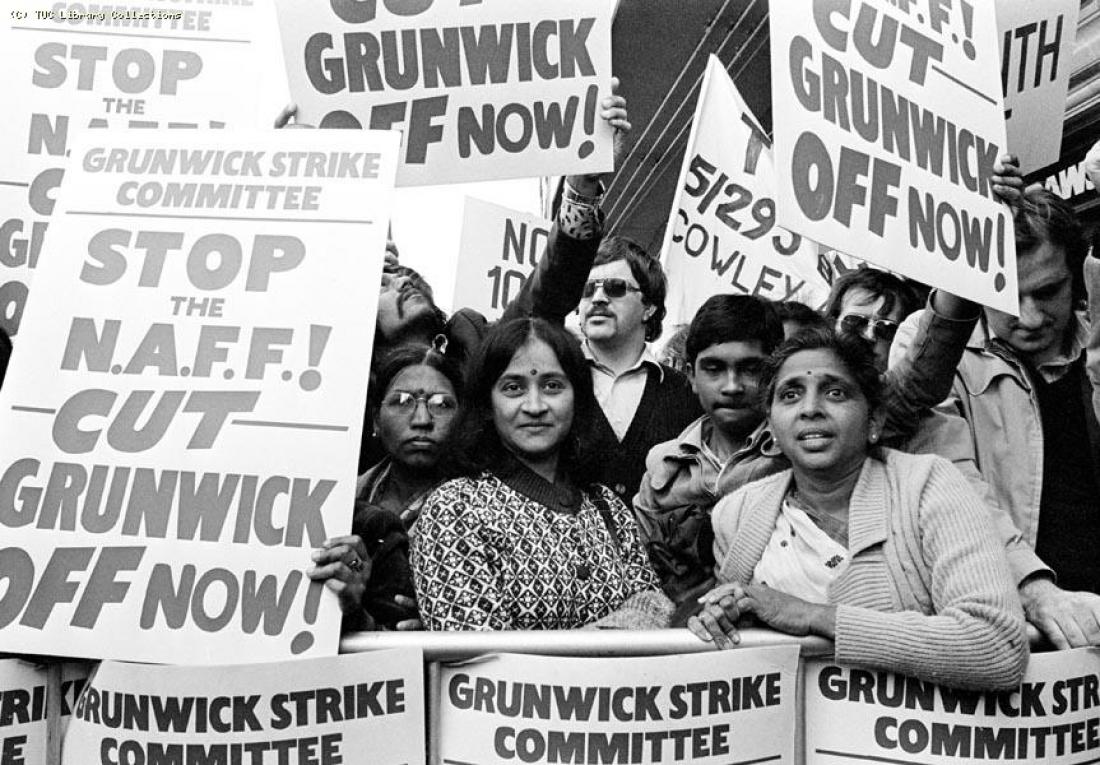The exhibition charts the significant role played by South Asian women in two historic industrial disputes - the Grunwick strike of the 1970s and the Gate Gourmet dispute in 2005.
It is organised by Ruth Pearson, Professor of Development Studies at the University of Leeds, Professor Linda McDowell of the University of Oxford and Dr Sundari Anitha of the University of Leeds, and is based on a project funded by the Arts and Humanities Research Council (AHRC).
On a hot August afternoon in 1976, Jayaben Desai led a walk-out at the Grunwick photo processing laboratory in Willesden, starting a two-year strike that has passed into the annals of trade union history.
"The very idea of a shop steward in a sari was a novelty"
(Jack Dromey and Graham Taylor, 1978)
Another August day, 29 years later, and another group of workers - this time assembling airline meals rather than processing holiday snaps - also left their posts, initiating a lock-out at Gate Gourmet, and disruption at Heathrow at the busiest time of the year.
Through images, text and interviews, the exhibition sets these two disputes in the wider context of South Asian women's activism in the workplace and explores their similarities and differences, separated by three decades but united by women's courage, their struggle against poor working conditions and low wages and by the stereotypical representations of minority women workers by the British press and in other texts of the time.
For the women themselves both disputes were about the right to decent working conditions and dignity and respect in the workplace:
"You had to get permission to go to the toilets. This woman said to me that she felt ashamed to ask to go to the toilet, so she held back and was in extreme discomfort."
(Grunwick)
"I had never touched meat before. In the beginning, the others helped me out, but then they were like, it's your daily job, you find a way to do it!"
(Gate Gourmet)
In their own eyes, their struggle was one in which the rights of all workers was a central element and the support of the wider labour movement was important. In the earlier dispute, the striking workers had huge support throughout 1977 with mass secondary picketing by a range of trade unions, anti-racist organisations and feminist groups. But the violence of the picket line lost them popular support.
By 2005, circumstances had changed in Britain and secondary picketing was illegal. As the exhibition documents too, the events at Gate Gourmet were more complicated and union support equivocal. A timeline round the exhibition links the two strikes and shows the changes not only in labour legislation but in women's rights and equality laws and in the numbers and treatment of economic migrants into the UK.
Professor Pearson said: "Ultimately, both disputes were failures. The majority of workers who took action were not reinstated. Despite this Grunwick is seen as an iconic moment when the rights of minority women workers were accepted as equal to those of British workers and when the male-dominated trade union movement had to ask itself questions about its practices."
Striking Women: Voices of South Asian women workers from Grunwick and Gate Gourmet runs from Thursday 8 October 2009 to Wednesday 31 March 2010 in The Women's Library at London Metropolitan University, Old Castle Street, London E1 7NT. It is open 9.30am-5.30pm Mon, Tues, Weds, Fri; 9.30am-8pm Thurs; 10am-4pm Sun. Admission is free and there is no need to book.
The Women's Library is holding over the same period an exhibition entitled Ms Understood, celebrating forty years of the Women's Liberation Movement in Britain.
Further information
For more information, or requests to interview Professor Pearson, please contact Simon Jenkins, senior press officer, University of Leeds, on 0113 3435764 or email [email protected]
Notes to editors
1. Ruth Pearson is Professor of Development Studies at the University of Leeds, and there is more about her work here: http://www.polis.leeds.ac.uk/about/staff/pearson/
2. The 2008 Research Assessment Exercise showed the University of Leeds to be the UK's eighth biggest research powerhouse. The University is one of the largest higher education institutions in the UK and a member of the Russell Group of research-intensive universities. The University's vision is to secure a place among the world's top 50 by 2015. www.leeds.ac.uk<http://www.leeds.ac.uk>
3. Its Faculty of Education, Social Sciences and Law brings together internationally-renowned expertise in these key areas of human interaction. Its four schools - education; sociology and social policy; politics and international studies; law - embed world-leading research into a range of undergraduate, postgraduate and professional development courses. www.essl.leeds.ac.uk/<file:///C:Documents%20and%20SettingsextkalDesktopw...
4. Each year the Arts and Humanities Research Council provides approximately £102 million from the Government to support research and postgraduate study in the arts and humanities, from languages and law, archaeology and English literature to design and creative and performing arts. In any one year, the AHRC makes approximately 700 research awards and around 1,350 postgraduate awards. Awards are made after a rigorous peer review process, to ensure that only applications of the highest quality are funded. The quality and range of research supported by this investment of public funds not only provides social and cultural benefits but also contributes to the economic success of the UK. www.ahrc.ac.uk<http://www.ahrc.ac.uk/>
5. Established in 1926, The Women's Library is an archive, museum and library housing one of the greatest collections of women's history in the world. It is part of London Metropolitan University. www.thewomenslibrary.ac.uk<http://www.thewomenslibrary.ac.uk/>
Simon Jenkins
Senior Press Officer
University of Leeds
(+44) 113 3435764 (w)
(+44) 7791 333229 (m)



